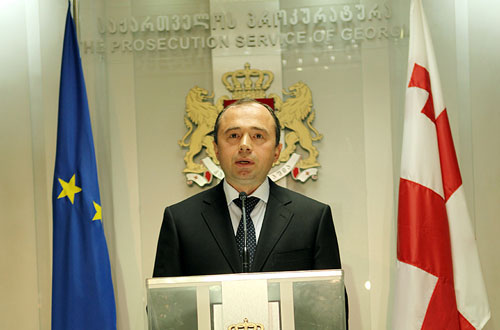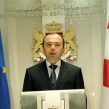
Ivanishvili and Coalition Partners Threaten to Incriminate Georgia over 2008 Russian Invasion (Part Two)
Publication: Eurasia Daily Monitor Volume: 10 Issue: 72
By:

Georgia’s Prosecutor-General Archil Kbilashvili (formerly a legal counsel to the current Prime Minister Bidzina Ivanishvili), Justice Minister Tea Tsulukiani (who does not have a formal degree in law), Georgian Dream parliamentary majority leader Davit Saganelidze, and Defense Minister Irakli Alasania are all announcing criminal investigations against lame duck President Mikheil Saakashvili and his former government of the United National Movement (UNM), which now forms the parliamentary opposition. The proposed investigations into alleged culpability for the 2008 Russia-Georgia war would run on parallel tracks with the investigation announced by Ivanishvili himself (see EDM, April 16).
While Ivanishvili threatens to incriminate Saakashvili and the UNM’s former government for the start and the political consequences of that war, Ivanishvili’s allies are urging investigations into Georgia’s military performance and into alleged crimes against humanity and war crimes, which they apparently impute to the Georgian side. Ivanishvili’s team members never raised such accusations against the government during the four years until 2012, when the Georgian Dream coalition instrumentalized these issues in the parliamentary election campaign. Following their electoral victory, Georgian Dream leaders are using these issues again, this time as an instrument to crush the opposition UNM.
Kbilashvili and Tsulukiani seem to have discovered a legal theory whereby Georgia “has an international obligation” at this time to carry out internal investigations into war crimes or crimes against humanity, possibly committed during the 2008 war. Kbilashvili first claimed on March 31 that “representatives” of the Prosecutions Office from the International Criminal Court (ICC) in The Hague recently asked: “Is the new Georgian government prepared to give a proper [sic] assessment to the August 2008 events and to answer, if war crimes and genocide occurred? We must set up an investigative group and proceed to investigate. I expect that the President will also be questioned” (see EDM, April 1). Implying thereby that the existing Georgian and international assessments were not “proper” ones, Kbilashvili has introduced the notion that a reassessment “is now our obligation.” He has not identified those ICC “representatives,” and has not explained why Georgia must do that “now.”
On April 11, Kbilashvili reaffirmed that his office would appoint a group of prosecutors to investigate allegations of war crimes or crimes against humanity, already “under preliminary examination” by the ICC’s Prosecutions Office in The Hague (Civil Georgia, April 12). Apparently, he was alluding to Russian and South Ossetian allegations against Georgia, filed in 2008 with the ICC.
In a similar vein, Tsulukiani has mentioned reports and complaints about those types of crimes, submitted to the ICC “from various [sic] countries.” Consequently, she claimed, Georgian authorities must question Saakashvili and other former top officials, including some military personnel, “about whom there are specific allegations in The Hague.” Tsulukiani insisted that Georgia should carry out this internal investigation, as failure to do so would result in Georgia being investigated by the ICC (Rustavi-2 TV, April 8; Kviris Palitra, April 15–21).
This argument sounds like Moscow’s old threat to trigger an international investigation against Georgia, but it is being used to justify an internal criminal investigation against President Saakashvili and the UNM opposition. Kbilashvili and Tsulukiani operate non-transparently, not naming any sources, plaintiffs or international officials whom they purport to cite. Kbilashvili and Tsulukiani seem to allude to Russian allegations about Georgian crimes and purport to give them some credence. But they avoid referencing Russia openly, as this would show them using Russian cudgels in Georgia’s internal political battle, which would not go down well with their respective parties’ voters.
On April 10, Defense Minister Irakli Alasania announced that his ministry is about to start investigating Georgia’s conduct of military operations in 2008, how the reserve units acted, why the population was not evacuated, what caused the defeat, and how billions of dollars’ worth of military budget allocations were spent by the former government. Unlike some other Georgian Dream accusers of the former government, Alasania clearly identifies Russia as the aggressor that occupied Georgia’s territories. However, according to him, “Georgia’s failure to defend itself should be investigated” (Nezavisimaya Gazeta, April 11; Kviris Palitra, April 15–21).
Some of these lines of inquiry could be useful if conducted professionally, not politically and not with intent to criminalize. Saakashvili’s former government had, soon after the war, determined that reserve units, and the reserve mobilization system as such, broke down; and this finding led to remedial measures. The line of inquiry about failure to evacuate the Georgian population from South Ossetia seems biased from the start. The government at that time hoped to protect that population, rather than evacuate it, which in practice would have already initiated the ethnic cleansing that Russia then perpetrated on its own (see EDM, April 16).
On April 10, Georgian Dream parliamentary majority leader Davit Saganelidze announced that a parliamentary commission will soon be mandated to investigate the 2008 war’s origins and consequences. Saganelidze made clear that this commission would contradict the 2009 inquiry’s findings, established by a cross-party commission in the UNM-majority parliament (RFE/RL, April 10). In 2008–2012, the parliamentary opposition acted in consensus with the government on all matters related to the Russian invasion and occupation. For Georgian Dream leaders, however, party-political interests seem to override the country’s interests. To hit at the opposition (the former government), some Georgian Dream leaders seem ready to consider exonerating Russia and contradict or dilute the widely-held international view that Russia was the aggressor in 2008.
* * *
Note of clarification:
Since my stay in Washington a decade ago, I have been a regular follower of the Jamestown Foundation’s publications. I have always appreciated the high quality of Jamestown’s analysis and research on the South Caucasus and beyond; while I have not always agreed with Mr. Vladimir Socor’s writings, I have always found them interesting and worth reading. Of course, I know Mr. Socor for many years, and respect his expertise and experience. It is therefore with some unease that I find myself writing you today.
In two articles for the Eurasia Daily Monitor, I find that Mr. Socor is mischaracterizing my position on very important issues. In an April 16 article, Mr. Socor states that my party—the Our Georgia-Free Democrats—is “pushing for investigations to be launched” against President Saakashvili regarding the Russian-Georgian war in 2008. The following day, Mr. Socor more specifically refers to the ongoing efforts I have initiated at the Ministry of Defense on lessons learned from that war, stating that “some of these lines of inquiry could be useful if conducted professionally, not politically and not with the intent to criminalize.” Mr. Socor’s first statement is factually wrong: neither I nor my party has pushed for, nor do we support, investigations against the President concerning the war in 2008. As for the inquiries I have initiated at the Ministry of Defense, they are exactly what Mr. Socor claims to support: they are being conducted professionally, are entirely non-political in character, and have no intent to criminalize anyone.
To military analysts anywhere, the practice of reviews of past performance for the purpose of learning lessons for the future is well-known and intrinsic to the professional development of the armed forces. They are conducted regularly by the US and other NATO militaries, and I see this exercise as an important part of Georgia’s efforts to join NATO. The reason I have ordered this inquiry now, five years after the war, is simply that it had not been done under the previous administration.
In speaking publicly about this inquiry, I have been careful to underline that Russia started an aggressive war campaign against Georgia, a sovereign country, and occupied its territories; and that no-one questions this and no-one will question it in the future.
I would also like to stress that under my command, the Ministry of Defense has worked successfully with the National Security Council, under President Saakashvili’s command, on the Strategic Defense Review that my Ministry is currently completing. For the purposes of the current inquiry, I have reached out to National Security Council Secretary and especially his Deputy Mr. Kutelia, as his experience serving as Deputy Minister of Defense during the war will be very valuable for this inquiry.
I would be grateful if the Jamestown Foundation would make public a correction to these published articles.
–Irakli Alasani
Minister of Defense of Georgia




